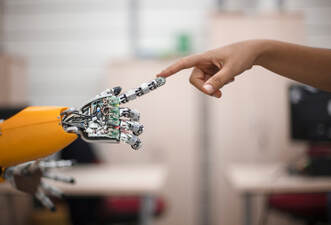
At times I was intrigued by the book, interested enough to finish it, but at other times I was appalled and saddened by it, by individuals who believe that they can overcome death and live for ever even if it means their bodies being preserved in cryonic suspension until they can be revitalised or their thoughts being transferred to a computer so that their minds can live forever in a machine. It seemed quite daft, the stuff of science fiction but there were clever, highly qualified scientists involved in these developments as well as enthusiasts committing their lives to it. There were individuals like Elon Musk donating millions of dollars to such projects and there was Google’s anti-ageing and rather secretive Calico project that describes itself as “increasing health …… with cutting-edge science and transformative technology”. And for all I was appalled by some of this I’m caught up in it as Google has such an influence in my life in all sorts of ways. I’m regulated, like many others, by algorithms and dependent on technology.
This desire to live forever is not new. Greek myths and legends from many different cultures illustrate the desire for immortality. Religions offer it, if not in this life then in one to come and death is not the end but only the doorway into eternal life. Judaism, Christianity, Islam and the Baha’i Faith believe in a spiritual entity or soul and talk in terms of an afterlife, heaven or paradise, understood by some as a place and by others as a state. Eastern religions also believe in a spiritual element that finds ultimate meaning after a series of rebirths in ultimate salvation and the merging with that which is infinite. Martyrs sacrifice their lives to enjoy this eternal life. For some religious believers it is the belief in eternal life that gives meaning to the ordinariness of everyday life and makes some sense of suffering and death.
With the decline of religion, belief in an afterlife has gone for many people. So for some like those in Silicon Valley meaning is to be found in an afterlife which is mechanistic and technological. And if that is to be our future (only of course for those who can afford it) where is the joy, love, warmth, sense of adventure, struggle through success and failure, surprise – all the things that help us make the most of this wild and precious life which is ours and which is a gift to be valued. For my part both the transhuman and the religious future fail when they project their energies, thoughts and intentions into the future and neglect the embodiedness (if there is such a word) of the present. And if we are to take that embodiedness seriously then we realise that we are links in a chain of life that goes right back even to the beginning of time. We are products of evolution, we are connected to our ancestors and to those coming after us. We are not isolated individuals but deeply connected to life. This present moment is to be enjoyed and appreciated. And in doing so we can contribute now to how life will evolve and what it will look like in the future – not, I think by design, but by living life to the full, trying to be the best we can be, trying to live with love and compassion. For me, life is a mystery and gift. Who knows what the future will hold but we do know we can influence that future by how we live now.
Let’s do it well for the sake of future generations.


 RSS Feed
RSS Feed
